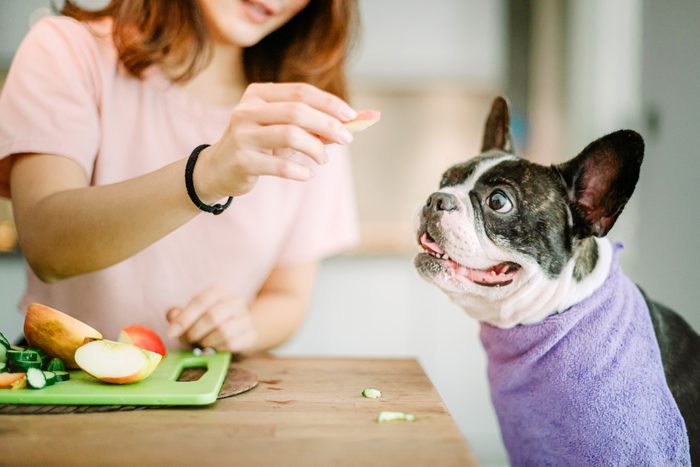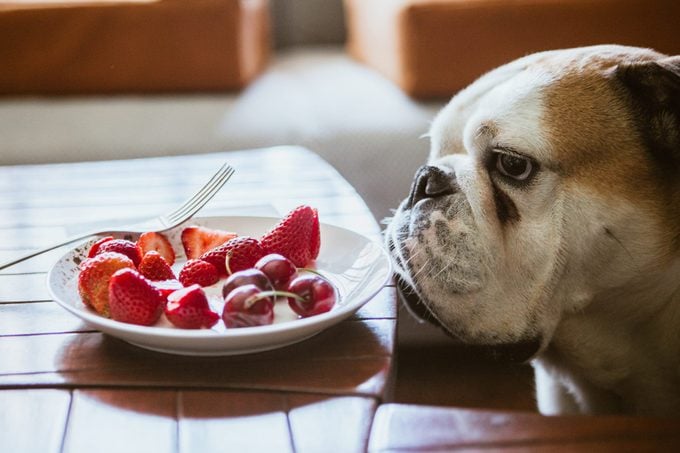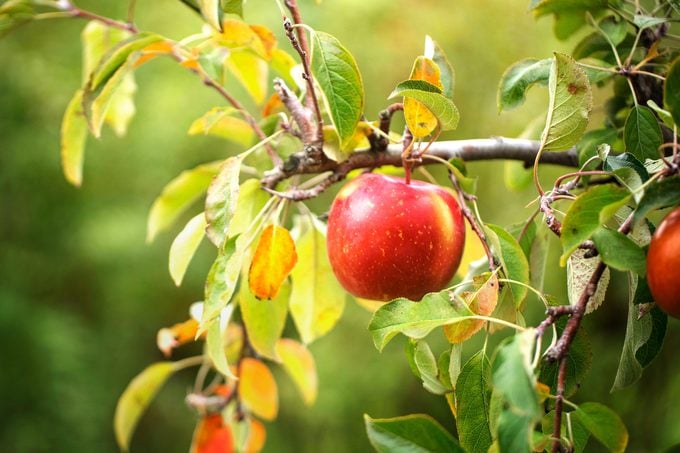Can Dogs Eat Apples? Here’s the Answer Multiple Veterinarians Give
Updated: Jun. 16, 2023

Two vets unpeeled the truth on whether dogs can eat apples, plus core tips to help your dog avoid exposure to toxins from eating any kind of apple product.
An apple a day might keep your doctor away—but if you’re a pet parent, you’ve probably heard that it’s typically not great for your pet’s health when you share the food we humans eat with your pup. With multiple sources suggesting that the pandemic led to the highest rates of pet ownership in U.S. history, millions of Americans have studied up—or learned the hard way—about the foods that are real no-no’s for dogs. For example, searches for Can Dogs Eat Avocado? suggest pet owners are curious whether the healthiest foods for us are also healthy for our fur babes.
Apples are another wholesome food for most humans (except for those who have conditions such as a pectin allergy). Apples happen to be an increasingly popular ingredient in many dog treats, and plenty of dogs seem to enjoy the occasional juicy slice with their owners. But, are apples something that are good for your dog? Two licensed veterinarians helped us get to the stem of the question.
Can Dogs Eat Blueberries? 10 Things Veterinarians Want You to Know
Why it’s important to pay attention to your dog’s snacks

You probably put some genuine intention into choosing the just-right pet food for Fido, but maybe you’re more relaxed about snacks or treats—especially those involving people food. Who can resist those big eyes begging for just a nibble of whatever you’re having?
Why It Feels So Good to Look in Your Dog’s Eyes
However, knowing what foods are unsafe for your pet is a super important part of being a responsible pet parent, says Efrem Hunter, DVM, MBA, a veterinarian and director of Veterinary and Scientific Affairs who conducts research on pet food safety and nutrition at Blue Buffalo. “Not all human food agrees with our furry friends,” Dr. Hunter says. “In fact, some can cause them to get ill or even seriously sick.”
He adds that even if it doesn’t make them really sick, some human food is like “junk food” for dogs—sure they like eating it, but it does not positively contribute to their overall health and wellbeing. Says Jacqueline Brister, DVM, a veterinarian and consultant for Embrace Pet Insurance: “Many pet owners consider their pets to be true members of their family, so paying attention to ingredients helps prevent unnecessary pain and suffering and can help them live longer.”
Unfortunately there are some “normal” foods that are so toxic that even small amounts can cause death without treatment, like grapes or raisins in some dog breeds, products that contain even the tiniest amounts of the sweetener xylitol (sometimes now referred to by other sneaky names such as “birch sugar”), and certain types of chocolate, Dr. Brister explains.
The 9 Best Dog Breeds That Help With Anxiety, According to Animal Experts

So, can dogs eat apples?
Yes, our doctors say—dogs can eat apples, which can be a fun and healthy snack for most pooches. However, eating apples shouldn’t be the main source of nutrition for your doggo. The fruit itself is relatively safe to eat in moderate amounts, usually no more than one to three slices per day.
If you’re going to serve apple to your dog, our veterinarians recommend you follow these steps:
- Wash the apple thoroughly
- peel it
- core it (being careful to remove all seeds).
- Then cut the apple into bite-size pieces or slices so your pup doesn’t choke.
Dr. Hunter says that for prepackaged pet snacks containing apples, make sure you read through the entire list of ingredients and choose snacks from a reputable manufacturer. He recommends looking for dog snacks with a short ingredients list of whole foods (like chicken and apples), and without a lot of additives and preservatives.
Be sure to follow the serving size listed on the package, as eating too much of anything can cause stomach upset or even a condition like pancreatitis (and dogs are notoriously bad at self-regulating with snacks!).
Research Shows Owning This Type of Pet Could Extend Your Lifespan
Apple seeds are toxic to dogs
The big (actually, tiny) problem with dogs eating apples are the seeds. Apple seeds contain a form of cyanide that is released when the seeds are crushed. Seeds may be crushed through chewing, but it’s more likely dogs eating apple slices or chunks will swallow the seeds whole (and then excrete them in the same form). A dog is more likely to ingest crushed seeds from baked goods or snacks made with whole apples that are blended or processed without removing the seeds first.
“Apple seeds can potentially be pretty unsafe. If enough of those crushed seeds were then chewed and swallowed by a pet, it could lead to cyanide poisoning,” says Dr. Brister.
Signs of cyanide poisoning in dogs appear about 15 to 20 minutes after consumption and include: Rapid breathing, muscle spasms, rapid heartbeat, drooling, watery eyes, vomiting, diarrhea, loss of bladder control, and hyperactivity.
Is there any reason to feed dogs apples?
Lots of dogs enjoy eating small amounts of apple, and Dr. Hunter says there are health benefits of apples that dogs need—including vitamin A, potassium, and vitamin C. Vitamin C can help your pet have a stronger immune system, improve their bladder health, and protect joints. Dogs naturally produce their own vitamin C, so they don’t need a supplement—but adding some through their diet, including apples, can give them a healthy boost, he says.
Apples also contain pectin, a type of soluble fiber, which can help regulate their bowel movements.
These Are the 3 Most Common Dog-Walking Injuries, New Johns Hopkins Study Says
Potential health problems from eating apples for dogs
Cyanide poisoning aside, some dogs simply may not tolerate eating apples and may experience an upset stomach when eaten in large amounts. This is especially true when dogs eat apple peels. While apple peels aren’t poisonous (and while apple peels hold substantial nutrients for humans), apple peels are known to cause intestinal issues for pets, says Dr. Hunter.
Pay attention to any signs that your furry friend is in distress after eating apples:
- Nausea
- Vomiting
- Changes in bowel movements
- Lethargy
- Marked changes in behavior
In some cases, pets prone to calcium oxalate bladder or kidney stones might want to avoid apples, as this fruit has a high oxalate content, adds Dr. Brister. Talk to your vet about any specific dietary concerns you have for your individual dog.
What to do if you think your dog is having a bad reaction to something they ate
Whether it’s apples or something else you gave them from your plate, if your dog is showing signs of distress, give your vet a call. “If you’re worried, don’t hesitate to reach out!” Dr. Brister says. “We get these kinds of calls all the time and we will be able to tell you whether the food or item eaten is concerning and what the next steps should be.” She adds: “Never try to treat a potentially toxic ingestion without a veterinarian’s advice.”
Another great option is to call the ASPCA’s 24-hour poison hotline (888-426-4435) or the Pet Poison Hotline (855-764-7661).
Keep everybody in your home healthy with The Healthy @Reader’s Digest newsletter. Keep reading:
- People Who Did This One Thing at Age 50 Were the Healthiest at Age 80
- How to Massage Your Dog, According to Certified Dog Massage Therapists [With Instructional Video]
- Teachers in All 50 States Just Revealed How They Recover from Burnout
- If You Don’t Eat Sweet Potatoes Every Day, This Might Convince You to Start


















